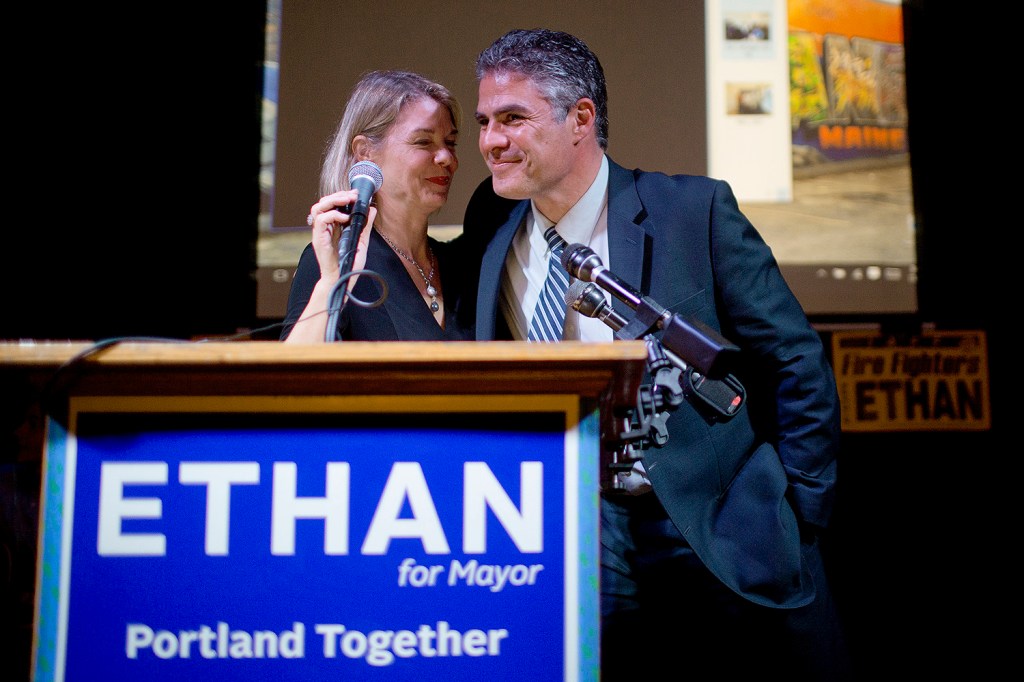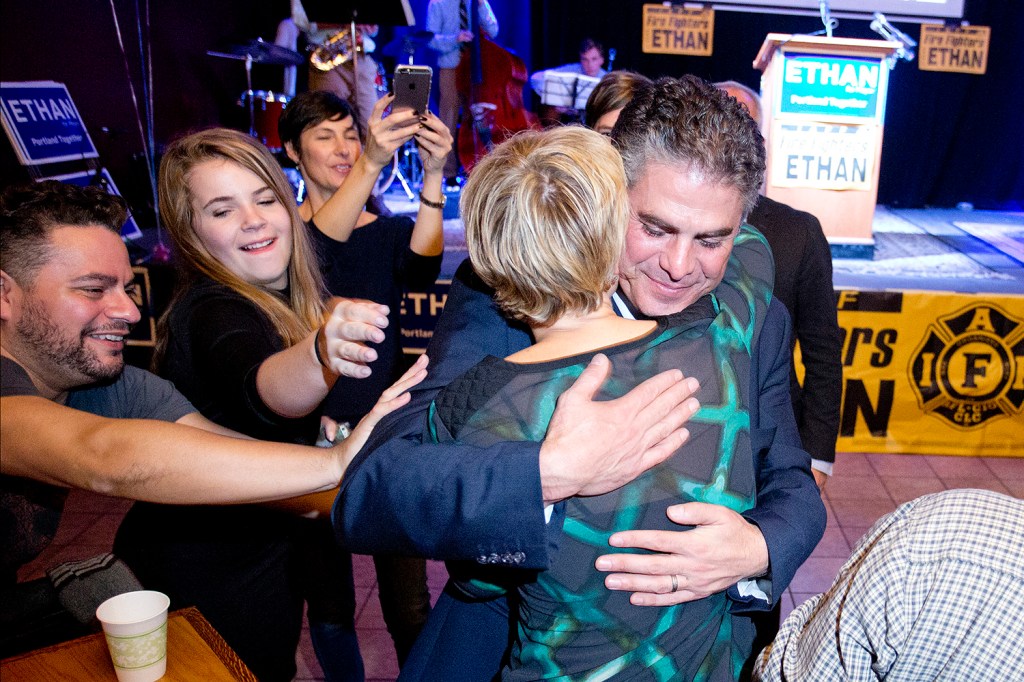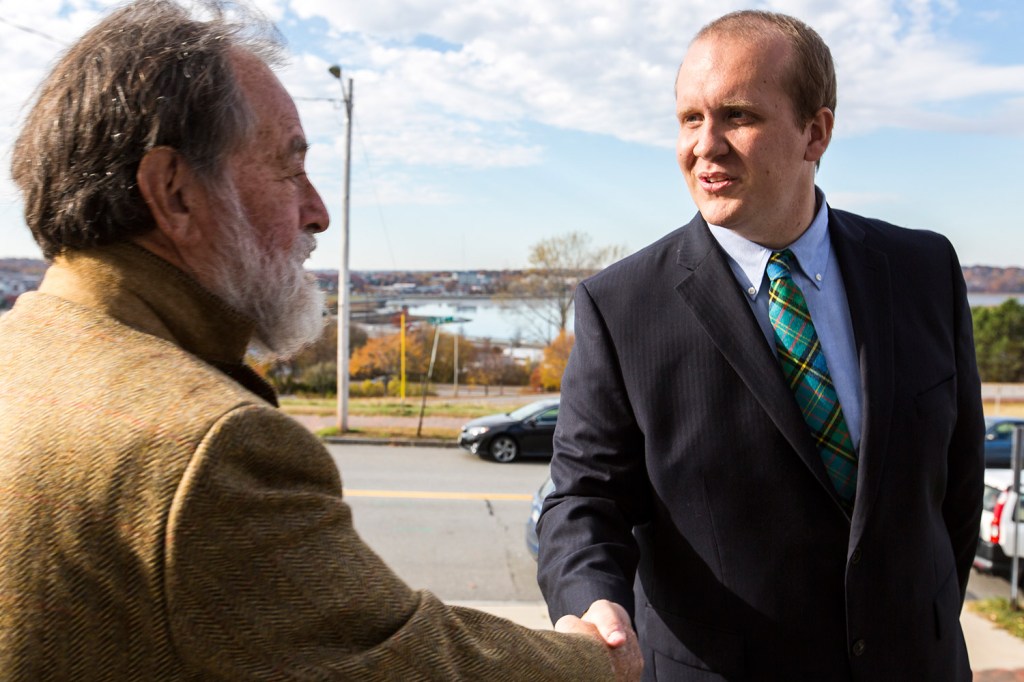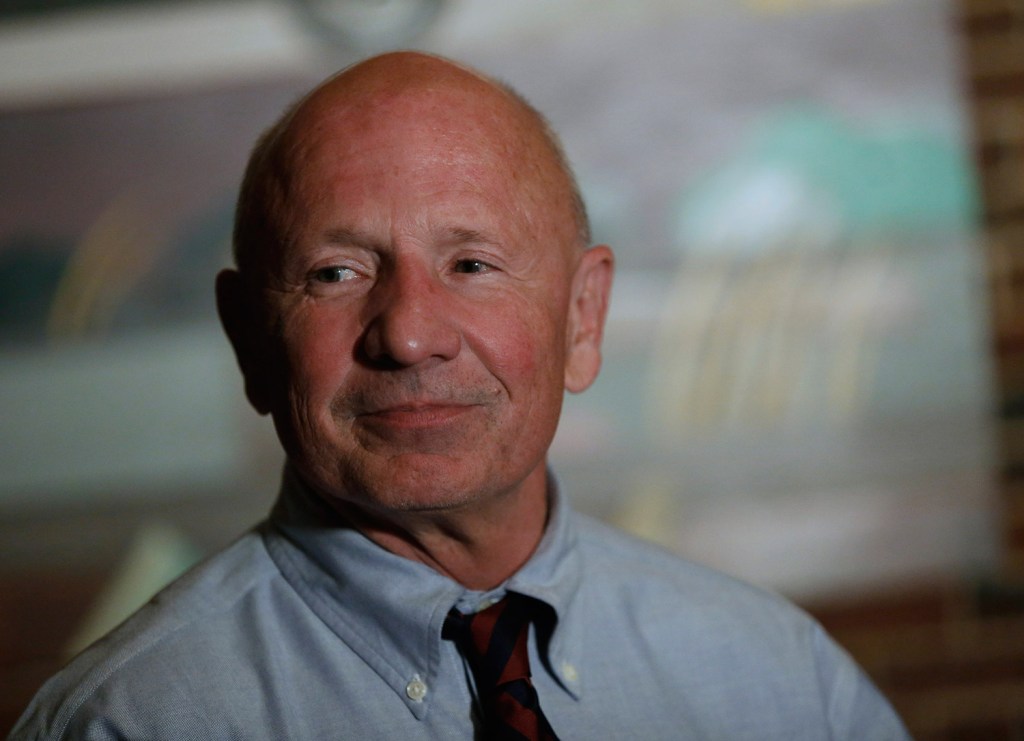Ethan Strimling unseated incumbent Michael Brennan on Tuesday to become Portland’s new mayor.
Strimling, a nonprofit director and former state senator, received more than 51 percent of the vote, according to preliminary results. He had 9,162 votes to 6,882 – 38 percent – for Brennan. Green Independent Party leader MacMillan received 1,880 votes.
Because Strimling got more than 50 percent of the vote, an instant runoff was not required.
The mayor’s race, along with two contentious referendum questions, brought out a steady stream of voters throughout the day in Portland, according to election workers.
At Strimling’s election night party at the Portland House of Music downtown, the mood was upbeat early, with a jazz band playing standards in front of a projection screen showing giant photos of the candidate riding a scooter at the Mount Katahdin summit and interacting with voters. The candidate arrived shortly before 9 p.m. and joined a crowd of about 150 people, hugging and chatting with supporters as camera crews followed. The crowd erupted when Brennan conceded less than an hour later.
Strimling thanked the crowd and acknowledged the large and diverse coalition of supporters, some of whom have competing interests, such as the labor unions and business groups. He acknowledged that he won’t always be able to please everyone, but said everyone will have a place at the table when it comes to policy discussions.
“This is not about one person. This is not about me. It’s about all of us together,” said Strimling, noting his support among the city’s Somali and Sudanese residents.
“Every voice was invited to join this campaign, and they did.”
After congratulating Strimling, Brennan told reporters and about 40 supporters at Sonny’s on Exchange Street that being mayor was a “tremendous honor” and he was proud of his accomplishments over the past four years, including establishing a $10.10 an hour minimum wage in the city and preserving emergency assistance for asylum-seeking immigrants after the state eliminated General Assistance funding.
“When necessary, when appropriate, and often, we stood up to the governor and told him what he believed in was not what we believe in here in Portland,” Brennan said. “And I still have another month, so who knows what might happen in the next month and what we might be able to accomplish.”
BRENNAN’S GOALS FOR REST OF TERM
Asked about his sometimes-rocky relationship with the City Council, Brennan said most of his accomplishments were done with the council’s support but there is always tension between the Portland mayor and other councilors.
“Did that influence the outcome of the election? I think so,” Brennan said. “I think it set a tone at the beginning and it became, unfortunately, a focal point of the discussion.”
Brennan said he will spend the next month exploring ways for some of his yet-unfinished goals to continue under Strimling, if possible. He said he was unsure what he will do after leaving office.
This is Portland’s second mayoral race since 1923. In 2010, the city voted to abandon the council-appointed mayor, who served a one-year term in a ceremonial post, in favor of a popularly elected mayor. The position carries no real power, since the day-to-day operations and oversight of city staff are handled by the city manager. Rather the strength of the mayor, who earns $70,000 a year, lies in the post’s four-year term and full-time presence in City Hall.
Portland’s mayor is chosen through ranked-choice voting. If no candidate had earned more than 50 percent after the first round of voting, an instant runoff would have been held and the second-choice votes on the third-place candidate’s ballot would have been reallocated.
As the city’s first mayor in 88 years, Brennan struggled at times with the City Council to establish new roles, while butting heads with Gov. Paul LePage.
Four of eight councilors, as well as seven of nine school board members, backed Strimling this year, citing frustration with Brennan, who they said didn’t listen to their concerns or priorities, preferring instead to focus on his own policy initiatives.
At the polls Tuesday afternoon, there was evidence that both Strimling’s and Brennan’s messages resonated with voters.
“I’m pleased (Brennan) has gone head-to-head with LePage, who I’m not a fan of,” said Molly Sullivan, 34, after casting a ballot at Woodford’s Congregational Church in District 3.
STRIMLING CITES COUNCIL SUPPORT
But for voters like Rita Ramsay, 51, it came down to personality, rather than policy. “I think Brennan’s done a good job, but I follow Ethan and like the direction he’s heading,” she said.
In an interview with the Press Herald after his victory speech, Strimling emphasized bringing together the council and speaking as “one voice” instead of nine councilors having disparate agendas. Strimling already has the public support of half the council, and he thanked councilors Nick Mavodones and Ed Suslovic for encouraging him to run.
Mavodones praised Strimling’s communication and coalition-building skills, and said that, even though he agreed with Brennan on many issues, he didn’t see the mayor as an effective leader.
“It’s been a frustrating couple of years on the council,” Mavodones said. “It was time for a leadership change.”
Wilfreid Plalum, a Portland resident and immigrant from South Sudan, also celebrated Strimling’s victory, saying he met the mayor-elect at LearningWorks, an educational nonprofit that Strimling runs. Plalum now has a master’s degree.
“I think he will do better than the current mayor,” Plalum said. “He has a vision of bringing people together.”
This was the third time Strimling and Brennan faced each other in an election and the first that Strimling has won. It has become an unlikely political rivalry given their similar social views and policy goals.
Both ran unsuccessfully against Chellie Pingree in the Democratic primary for Congress in 2008, and Brennan edged out Strimling in the mayoral race four years ago.
Throughout this campaign, Strimling constantly rolled out endorsements from a variety of groups, who repeated his campaign theme of listening and calling for change. A prolific fundraiser, Strimling had raised over $100,000 heading into the final two weeks of the campaign – more than twice as much as Brennan, who raised $48,000, and MacMillan combined.
Staff Writers Joe Lawlor and Kevin Miller contributed to this report.
Send questions/comments to the editors.














